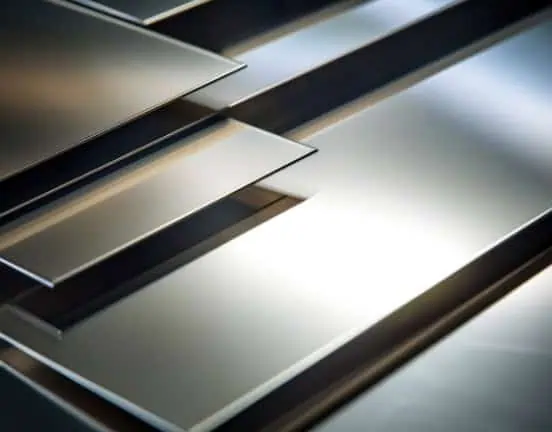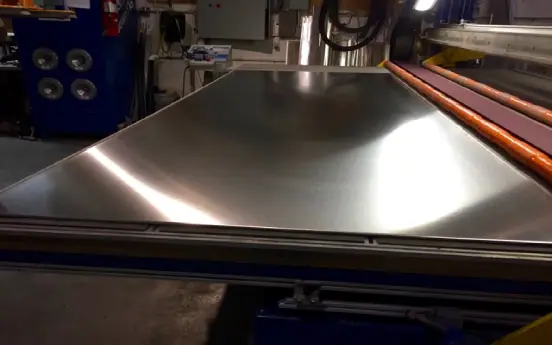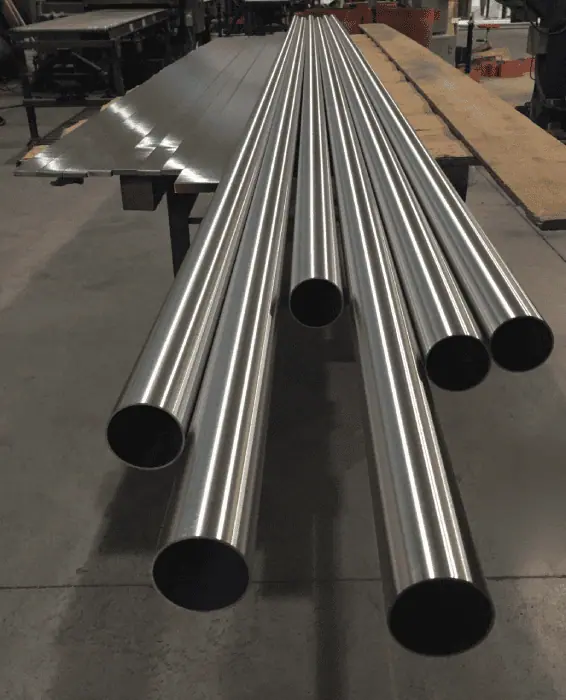Stainless steel finishes offer more than an attractive aesthetic. The surface finish can also improve the metal’s durability, reflectiveness, corrosion resistance, ease of cleaning, and more. Choosing the right stainless steel finish for your application requires careful consideration of its intended application. Learn about the different types of stainless steel finishes to determine the best one for your needs.
Types of Stainless Steel Finishes
A stainless steel finish is a fabrication process used to enhance the base metal’s surface characteristics. Finishes range from matte to mirrored to brushed. Here is an overview of the specific types of stainless steel finishes provided by AAA Metals.
-
Mill Finishes
Mill Finishes
These finishes are the starting point for mechanical polishing and other finishing processes. Hot or cold rolling is commonly used to apply this basic finish to all stainless steel sheets.
-
No. 1 Finish
No. 1 Finish
This stainless steel finish is produced by hot rolling, annealing, and then pickling the material in an acid solution. The process creates a dull finish ideal for applications where a smooth decorative finish isn't necessary.
-
No. 2D Finish
No. 2D Finish
This finish for stainless steel is produced by cold rolling the material, annealing it, and then pickling it in an acid. It creates a smooth, non-reflective, and dull finish commonly used for chemical equipment, hardware, and exhaust components.
-
No. 2B Finish
No. 2B Finish
The No. 2B stainless steel finish is created via cold rolling, annealing, and pickling the material in acid, then passing it through light-tempered polished rolls. This finishing process produces a smooth, semi-reflective, and bright finish for pharmaceutical equipment, tanks, cookware, and more.
-
Mechanically Polished Finishes
Mechanically Polished Finishes
In these finishing processes, abrasive materials are used to cut into the stainless steel's surface to a controlled degree.
-
No. 3 & No. 4 Finishes
No. 3 & No. 4 Finishes
Mechanically polishing a No. 2B finish substrate produces No. 3 and No. 4 finishes. There is corresponding grit for No. 3 and No. 4 to create the desired surface texture. The stainless steel is polished with a ceramic cloth back belt to create a uniform appearance. These are the most common stainless steel finishes, used for food processing components, sinks, elevators, and architectural panels.
-
No. 6 Finish (Satin, Scotch-Brite™)
No. 6 Finish (Satin, Scotch-Brite™)
This stainless steel finish is produced by a ceramic belt to a No. 4 finish and finished with Scotch-Brite™ to make a smoother finish than a No. 4.
-
No. 7 Finish (Reflective)
No. 7 Finish (Reflective)
No. 7 stainless steel finish is made by buffing a finely ground surface to create a highly reflective but not clear surface. Its high luster results in an almost mirror-like look with grit lines still visible on the material.
-
No. 8 Finish (Mirrored)
No. 8 Finish (Mirrored)
According to ASTM standards, No. 8 is the most reflective of all stainless steel finishes. To achieve a mirrored finish, the material must be polished with increasingly more abrasive grit, followed by buffing. The highly reflective properties of No. 8 finishes make them ideal for many everyday applications, like wall panels, signage, and press plates.
Benefits of Different Finishes
The different stainless steel finishes provide varying levels of durability, reflectivity, and smoothness. Each finish has its benefits, and understanding these is essential to selecting the right finish for your stainless steel project.
Surface roughness is a measurement of the substrate’s texture and impacts the material’s durability and performance. For example, a texture created by brushing stainless steel increases the material’s corrosion and wear resistance compared to smooth finishes. Polished or mirrored stainless steel may be less resistant to corrosion and wear over time, but it provides a pleasing aesthetic appeal. Brushed stainless steel finishes offer both aesthetic appeal and functionality.
Other benefits of various stainless steel finishes include:
How to Choose the Right Finish
Maintenance Tips for Stainless Steel Finishes
Stainless steel requires proper maintenance and cleaning to maintain its aesthetic appeal and functional properties over time. The first step for properly maintaining stainless steel is to select the appropriate cleaning procedure based on what needs to be removed, as the cleaning approach will vary whether it’s simple dirt removal or more complex removal of free iron contamination.
Using simple procedures and over-the-counter cleaners can keep stainless steel clean and looking like new. A damp towel or a water-based cleaner will remove loose dirt from stainless steel for a general clean. A professional-grade stainless steel cleaner can clean the surface with minimal effort while leaving behind an ultra-glossy look.
Additional tips for keeping stainless steel in optimal condition include:
Stainless Steel In A Variety Of Finishes by AAA Metals
Understanding the different stainless steel finishes and their characteristics is essential to choosing the right finish for your project. The perfect finish can help enhance the longevity, durability, and aesthetics of your products. Partnering with a knowledgeable metalworking supplier can ensure you get the results you need.
Since 1978, AAA Metals has been a leading distributor of stainless steel and other metals, with specialized knowledge in advanced finishing techniques. Our in-house stainless steel finishing capabilities use the latest polishing technology to provide many industries with quality materials. At AAA Metals, our team offers metal stock, cutting, shearing, and polishing services to meet customers’ unique needs. We offer stainless steel finishes 0-2 as stock metal without any polishing and provide polishing processes for finishes 3-8.
Contact us to learn more about our variety of stainless steel finishes and value-added services, or request a quote to start work on your project.



